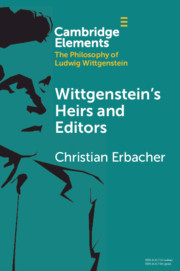Element contents
Wittgenstein's Heirs and Editors
Published online by Cambridge University Press: 16 September 2020
Summary
Keywords
- Type
- Element
- Information
- Online ISBN: 9781108878111Publisher: Cambridge University PressPrint publication: 10 December 2020
Bibliography
Primary Sources
Secondary Sources
- 14
- Cited by



